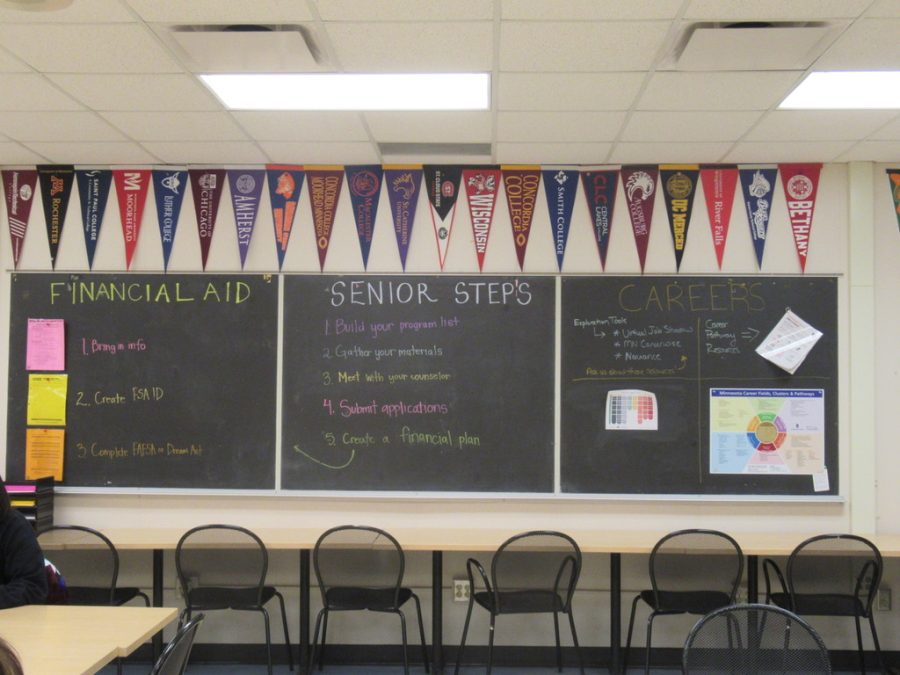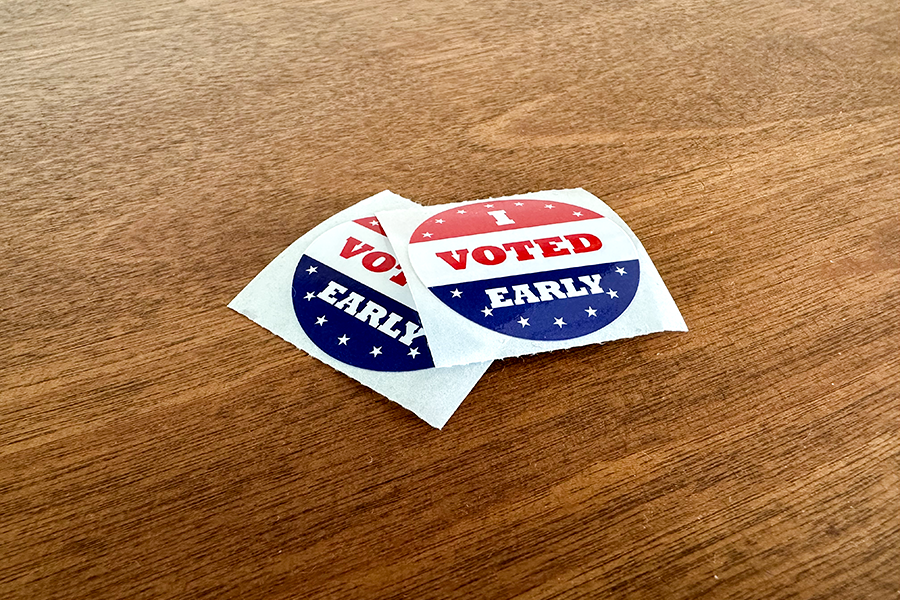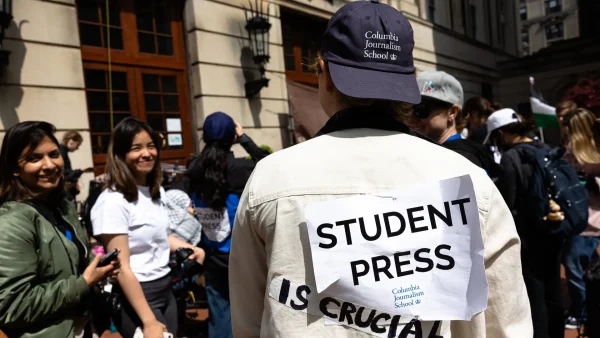South’s counseling department strives to support every student’s future
Counseling-based resources at South, such as the Career & College Center, work to support students in whichever post-secondary pathway they choose. Minneapolis coordinator Katherine Hauschild says that in the CCC, “there’s all these different pennants, whether it’s cosmetology schools or Ivy League schools, but it’s really the individual and what they want that will lead to their happiness and success.”
January 3, 2023
One of the biggest challenges facing high school students – especially those nearing the end of their time at South – is planning what to do next. A lot of the work done to support students in those plans is done by the counseling department. Two of the biggest resources at South for post-secondary planning are the My Life Plan curriculum and the Career & College Center (CCC), both of which are based in counseling.
The CCC is South’s hub for post-secondary counseling, staffed by two coordinators, Katie Hanson and Kelsey Massey, who focus on helping students plan what to do after graduating, whether that’s attending college, joining the military, or entering the workforce. While the CCC is a part of the counseling department, that focus is very valuable as the counselors work in other areas besides post-secondary planning. South counselor Kristin Overton described the CCC as “a phenomenal asset to our school… they live in that college and career world, and so we definitely… default to them a lot because they’re really the experts in the college and career side of things.”
All Minneapolis Public Schools high schools have a Career & College Center, and coordinators at multiple schools emphasized that, while seniors are more likely to seek out help with post-secondary planning, the CCC is a resource for all students. Katherine Hauschild, a coordinator for Southwest, said that their CCC is “for everyone,” and that the staff “really work to make it a space for students to come and talk about literally anything post-secondary, or what’s going on in secondary.” Hanson expressed a similar sentiment, saying that “the CCC is for all students at South, 9th through 12th, college-bound, career-focused, and everywhere in between… we provide support with post-secondary planning for all South students, for all pathways.” The CCC programming is available to all MPS high school students, regardless of their post-secondary plans.
One of the South CCC’s biggest goals is to improve the support it can provide to students who want to start working right after high school. “It’s not just the College Center, it’s the Career and College Center,” Hanson said, and she wants students who aren’t going to college to utilize the CCC as well. She explained that she and Massey have recently been focusing on “what the pathway looks like for students who aren’t doing a traditional two- or four-year college pathway, so… we’ve been refining the resources that we have for people who want to work and enter the workforce, so that they’re getting into jobs that have networking opportunities or opportunities for growth.” Hanson and Massey have been working to educate themselves on work opportunities so that they can better support all students, since not everyone plans to attend college.
Students, especially seniors, recognize the value of the CCC as a resource. The requirements for applying to college or for financial aid can be overwhelming. South senior Kayleen Kabba discussed the application process, saying that “it’s definitely been very stressful. I would say I’ve spent probably a total of 50 hours in the CCC, and I don’t think I would have been able to get through it without Katie and Kelsey.” Kabba described her CCC experience as “a breath of fresh air,” and said that Hanson and Massey “make it very simple. You know exactly what needs to be done, when you need to do it, how to get it done, and you have reassurance that you’re doing a good job. So it does make everything a lot less stressful.”
The second major program at South focused on post-secondary planning is the My Life Plan curriculum, which includes lessons for 9th through 12th grade and is run by counselors. Although students are self-directed in certain areas of the curriculum, such as career or college exploration, everyone receives the same lessons. This approach can mean that the lessons end up feeling repetitive, and it can be hard for students to see the importance of what’s being taught. The counseling staff has recognized these concerns. Overton explained that Hanson and Massey spent time “revamping the entire curriculum… based on the feedback that we got from students, because we wanted it to be something that was relevant, that was helpful, that was timely, that was purposeful… we didn’t want it to be a thing where we walk into the classroom and students are eye-rolling and thinking ‘Oh God, here they are again.’” Overton also explained that My Life Plan is a district-wide initiative, which means that it’s not designed with South students specifically in mind. However, the counselors try to adapt the curriculum to South as much as they can.
Resources like these can also help to improve equity between Minneapolis high schools, as the district encompasses students from a wide range of socioeconomic and cultural backgrounds. Every major MPS high school has a Career & College Center, and My Life Plan is also a districtwide program. Although there are significant differences between the student bodies at each high school, implementing the same programming is a way to level the playing field for Minneapolis students. Overton said that the districtwide My Life Plan curriculum “does make it equitable. Every student here is getting a My Life Plan lesson throughout their four years, so everyone’s getting the same information. And I think that’s a benefit.”
An additional benefit of district-wide implementation is that it allows for collaboration between programs at different schools. CCC coordinators at schools of similar sizes, such as South, Southwest, and Washburn, are able to discuss what works best for them and improve their outreach and connection with students. One of the obstacles that coordinators at large schools face is the sheer number of students to support. Washburn coordinator Hana Sato said that their CCC has “goals of wanting to meet with every single senior, as they’re starting to figure out their plan,” but because there are about 500 seniors and only two CCC staff, “a big obstacle that we have is how to actually do that without having some burnout.” Sato also said she wishes there could be more coordinators in all schools, but recognized the value of having the program in place at all.
While the resources that MPS has to offer aren’t perfect, they do demonstrate the sincere support that staff has for students. The counseling staff doesn’t see their role as imposing a particular future on students, but assisting them in whichever direction they choose. Overton said that South counselors “don’t want any student leaving here feeling like ‘My counselor didn’t support me’ or ‘The CCC didn’t support me,’ we want you to seek us out, know that we’re here to support you, know that we value every plan, every dream, every aspiration that you have.” Similarly, Hauschild said that “It’s really the individual and what they want that will lead to their happiness and success,” and that she applies that philosophy to her post-secondary counseling.
Post-secondary counseling isn’t just about filling out the Common App or writing a résumé, it’s about helping prepare students for the next chapter of their lives.






